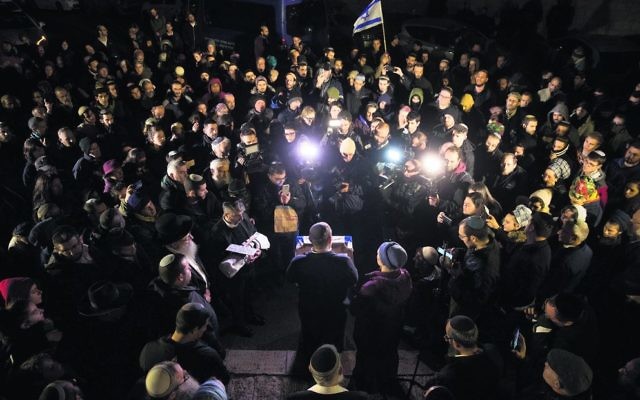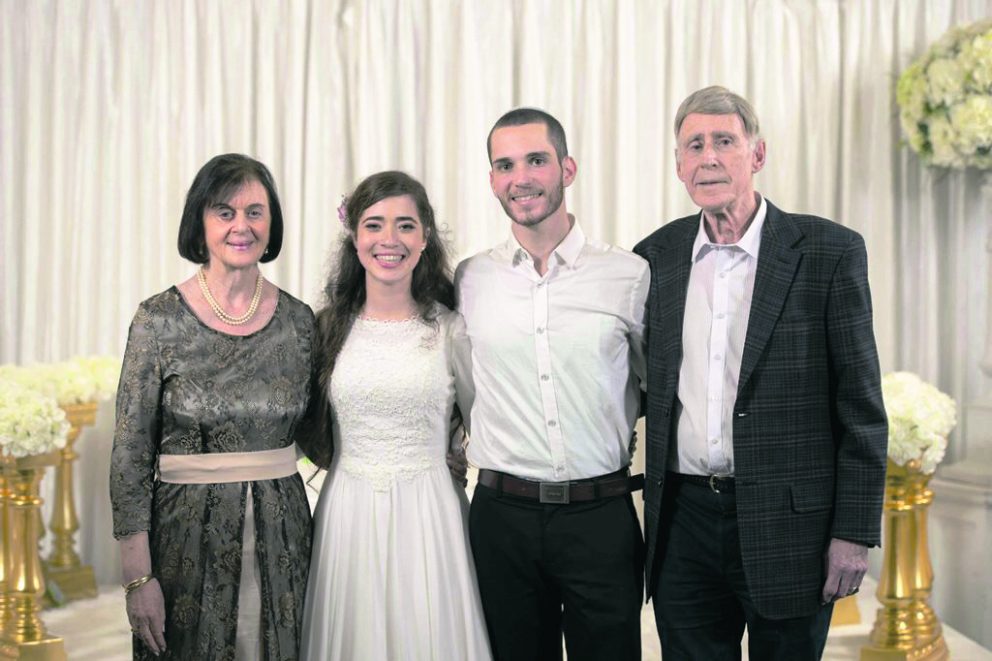Sydney olim reeling from fatal terror attack
An olah from Sydney has told The AJN of the precious moments with her great-grandson hours before terrorism claimed his life.
EXCLUSIVE: AN olah from Sydney has told The AJN of the precious moments with her great-grandson hours before terrorism claimed his life.
“I just felt that this is my first great-grandchild and I just had to spend time with him and touch him,” said Ilana Dubb.
Her moments in the hospital should have been the first of many, but they were her last. Soon after her second visit to the neonatal ward, the body of Amiad Israel was wrapped in a tallit and, looking far too tiny to be seen in a cemetery, buried in Jerusalem.
Dubb knows that if it wasn’t for the terrorist who opened fire at her granddaughter Shira Ish-Ran, the baby, delivered by emergency c-section after the attack, would still be safely inside his mother. “There are times I think I am okay and other times I just start crying,” Dubb said.
Just as Amiad was her first great-grandchild, he was the first grandchild for her daughter Liora Silverstein. “I still can’t believe it happened,” said Silverstein. “I think I’m going to wake up and see it was a nightmare.”
Silverstein has tried to keep a low profile since the tragedy, shunning interview requests. But she is an Australian citizen who made aliyah in 1991 from Sydney, where she worked for the State Zionist Council, and agreed to make an exception for The AJN.
“We saw the baby, we stroked the baby, we sang to the baby for all the days he was alive,” she said. “They were the three most dramatic days of my life.”
Silverstein is puzzled that the tragedy hasn’t received more attention in foreign media. “We actually really don’t understand why it hasn’t had more of an international impact,” she said.
To the relief of Dubb and Silverstein, Ish-Ran is making a good recovery from her serious wounds. She amazed doctors on Monday by giving an up-beat press conference in which she expressed gratitude to Israelis for their support, prayers and blood donations.
“I lost a lot of blood and I needed to receive a lot of blood,” she said. “I feel that the people of Israel support me emotionally and strengthen me physically. Most of my blood is now not even mine at all.”
Even before the press conference she told local journalists that she was determined to frustrate terrorists and bring “many more babies into this world”.
For the press conference Ish-Ran was sitting by her husband Amichai in Shaare Zedek hospital, and both were wearing hospital gowns. Silverstein hasn’t left her daughter since the attack. She said: “I’m here in the hospital, I don’t leave. Night is day and day is night and summer is winter.”
On the ward, she takes care of her daughter and tries to help her other children, one as young as eight, to process what has happened. They include Shira’s twin brother Ariel and another set of twins, aged 16.
Silverstein will always remember the devastating moment when she realised that her daughter and son-in-law had been shot. “I was at home, in the middle of teaching a private English lesson, and my husband came in and said, ‘Come quickly to the hospital.'”
As they drove, they saw and heard dozens of police and army vehicles heading to the terror scene to begin the manhunt for perpetrators.
“When we travelled to the hospital, police and the army were travelling in the opposite direction. Our daughter was in critical condition. I’ll never forget it.”
As Silverstein went from her house in the Beit El settlement to the hospital, Dubb was at home in Jerusalem, having just heard about the attack, but relatively sure that her family wasn’t involved.
“At half past nine on Sunday evening our son said, ‘I’ve just seen there’s been an attack,'” Dubb recalled. But early reports said that the pregnant victim was 30, so Dubb thought it couldn’t be 21-year-old Ish-Ran, who she sees regularly and who was “blooming and blossoming” since she became pregnant.
Soon, Dubb was also at the hospital with her husband Leo, waiting for news of Ish-Ran’s operation which she remembers being “touch and go”.
Suddenly, she wasn’t just at the centre of a personal tragedy but a national one. News cameras were focused on the hospital, and politicians were talking about little else.
“It somehow wasn’t intrusive because we felt the whole country and the whole world was with us,” said Dubb. “We received messages from people we hadn’t spoken to in 50 years.”
The messages gave her comfort, as did the fact that she was close by, and not in Sydney, where she lived from 1987 until 2014.
“I can’t imagine what I would have been like had I been far away in Australia,” she said.
Silverstein became religious as a young adult, and her hope in the hours after the attack came mostly from her faith. “I said, ‘What would my daughter want me to do?’ And from 10 o’clock at night until four in the morning, I did nothing but pray. I felt like I was a soldier on the battlefield. People said to come and eat something. I said no.”
There were many more difficult moments to come, including the funeral for baby Amiad. Her daughter and son-in-law weren’t allowed to leave the hospital and it fell on her husband Chaim to give one of the speeches, which he addressed to them.
“You got married just nine months ago, with such great joy, it was perfect,” he said. “And when we were told about the pregnancy what joy – the first grandchild, the first great-grandchild. By the seventh month the excitement was growing and we were joyfully lighting the eighth Chanukah candle at the home of Amichai’s parents.”
Then a “cruel enemy” fired bullets that “cut off the happiness, the expectation and the dreams”.
The Ish-Rans say that their baby has done more to unite Israelis and Jews than most people manage in a lifetime.
“We have been chosen for whatever reason, and my daughter sees it this way,” Silverstein explained. “This is national suffering. People feel Amiad was the baby of the nation, he has become like a symbol.”
She recalled a visit at the hospital from a politician representing the far-left Meretz party, who broke down in tears at the tragedy of her daughter, a settler.
“The furthest left and the furthest right have been here,” she said. “[They] came within five minutes of each other. We said, ‘This is unbelievable.'”
NATHAN JEFFAY



comments